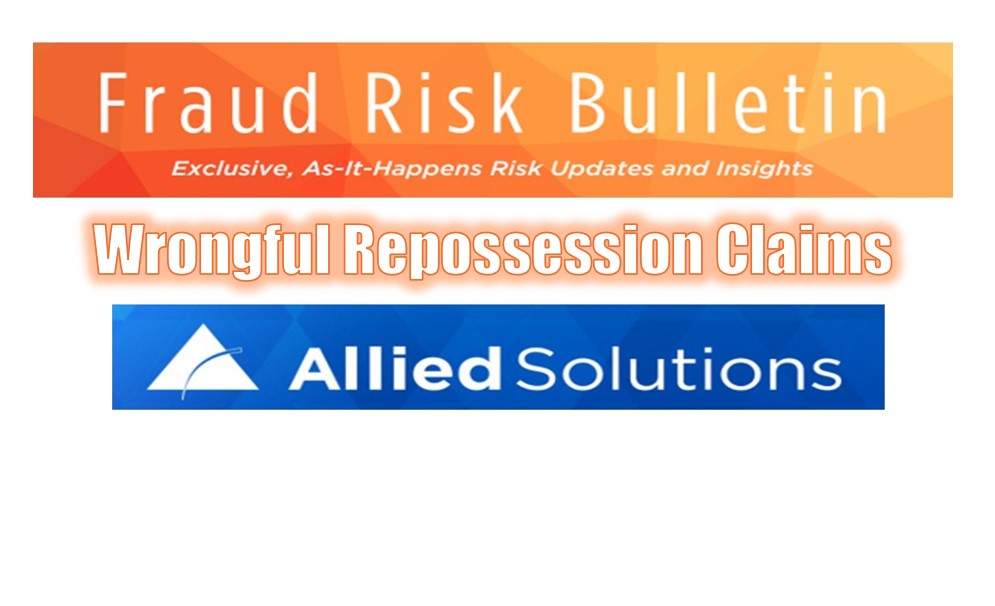RISK ALERT: Wrongful Repossession Claims
Summary
Wrongful vehicle repossession can take many forms. The financial institution could be wrong regarding account delinquency, miss or improperly communicate with the consumer before, during or after the repossession, or the party repossessing the vehicle could do so in an improper fashion, such as through a breach of the peace or fraudulent communications with the consumer. All these actions and missteps could lead to a claim of wrongful or improper repossession under the Consumer Fraud Act or under the Uniform Commercial Code.
Common Allegations
- Consumer hires an attorney to represent him / her in the legal proceedings, and the attorney discovers the defects in the Notice of Disposition and Notice of Deficiency letters.
- The financial Institution or agent engage in conduct that the consumer alleges qualifies as a “breach of peace” during a repossession.
- Violation of the Service Members Civil Relief Act (SCRA), which prohibits creditors from repossessing personal property, including a vehicle, without a court order, based on breach of a contract entered prior to active-duty military service.
- The creditor made full restitution just prior to the repossession.
Potential Damages and / or Penalties
In addition to the reputational harm to your financial institution, under UCC9-625 and 9-626, which vary by state, the following are potential damages or penalties:
- Waiving the deficiency balance
- Returning payments of deficiency balances
- Statutory penalties for each impacted consumer
- Return of service charges/interest paid
Risk Mitigation Steps
- Render a written legal opinion from an attorney that the components of your collection letters are meeting the requirements of UCC Article 9, sections 9-613, 9-614, and 9-616 UCC Article 9.
- Do not draft your own forms or rely on standard forms obtained from vendors without verifying their compliance with local and federal law through your compliance counsel to ensure forms are not missing statutory language.
- Consider your specific state(s) requirements which can have additional requirements for your repossession policy/procedures/collection letters.
- Notices of Disposition must contain the eight required items:
- 9-613(1)(A) describes the debtor and the secured party
- 9-613(1)(B) describes the collateral that is the subject of the intend disposition
- 9-613(1)(C) state the method of intended disposition
- 9-613(1)(E) states the time and place of a public disposition or the time after which any other disposition is to be made
- 9-614(1)(B) a description of any liability for a deficiency of the person to which the notification is sent
- 9-614(1)(C) a telephone number from which the amount that must be paid to the secured party to redeem collateral under Section 9-623 is available
- 9-613(1)(D) states that the debtor is entitled to an accounting of the unpaid indebtedness and states the charge, if any, for an accounting
- 9-614(1)(D) a telephone number or mailing address from which additional information concerning the disposition and the obligation secured is available
- Notices of Deficiency – UCC 9-616, subsection (a)(1)9B) must contain the six required items, in the required order:
- The aggregate amount of obligations secured by the security interest under which the disposition was made, and, if the amount reflects a rebate of unearned interest or credit service charge, an indication of that fact, calculated as of a specified date:
- If the secured party takes or receives possession of the collateral after default, not more than 35 days before the secured party takes or receives possession OR
- If the secured party takes or receives possession of the collateral before default or does not take possession of the collateral, not more than 35 days before the disposition
- The amount of proceeds of the disposition
- The aggregate amount of the obligations after deducting the amount of proceeds
- The amount, in the aggregate or by type, and types of expenses, including expenses of retaking, holding, preparing for disposition, processing, and disposing of the collateral, and attorney’s fees secured by the collateral which are known to the secured party and relate to the current disposition
- The amount, in the aggregate or by type, and types of credits, including rebates of interest or credit service charges, to which the obligor is known to be entitled and which are not reflected in the amount in paragraph (1)
- The amount of the surplus or deficiency
- Confirm compliance with the SCRA that prohibits creditors from repossessing personal property, including a vehicle, without a court order, based on breach of a contract entered prior to active-duty military service.
- Confirm the outstanding balance and recent payments just prior to the repossession.
- Develop an appropriate repossession subcontractor audit program to ensure you can review applicable policies and procedures of the subcontractors.
Risk Mitigation Resources
- REPO Plus® allows us to settle repossessed collateral damage claims on your behalf.
- Blog: Driving Recovery Excellence: Auto Claims and Repossessions for Credit Unions
- Webinar: Recovery Claims: Protecting Yourself & Your Consumer During Regulatory Crackdowns
- Webinar: Rising Repossessions and the Impact of Insurance Monitoring
The information presented in this document is intended for informational purposes only and should not be construed as legal advice or a legal opinion and it may not reflect the most current legal developments. You should seek the advice of legal counsel of your choice before acting on any information provided in this document.
RISK ALERT: Wrongful Repossession Claims – RISK ALERT: Wrongful Repossession Claims – RISK ALERT: Wrongful Repossession Claims – RISK ALERT: Wrongful Repossession Claims
RISK ALERT: Wrongful Repossession Claims – Credit Union Collections – Credit Union Collectors – Lawsuit – Lawsuit – Repossess – Repossession – Delinquency – Servicemembers Civil Relief Act – Servicemembers Civil Relief Act Centralized Verification Service













Facebook Comments